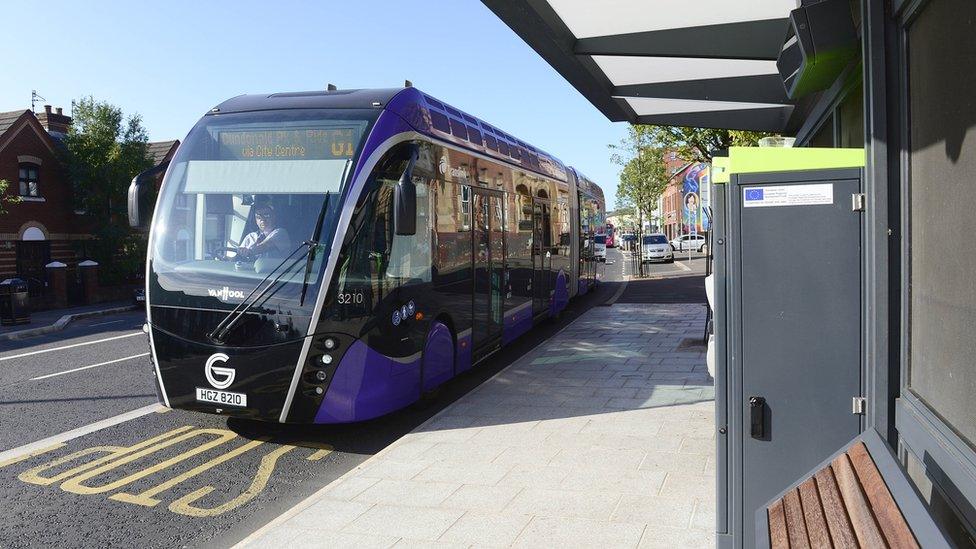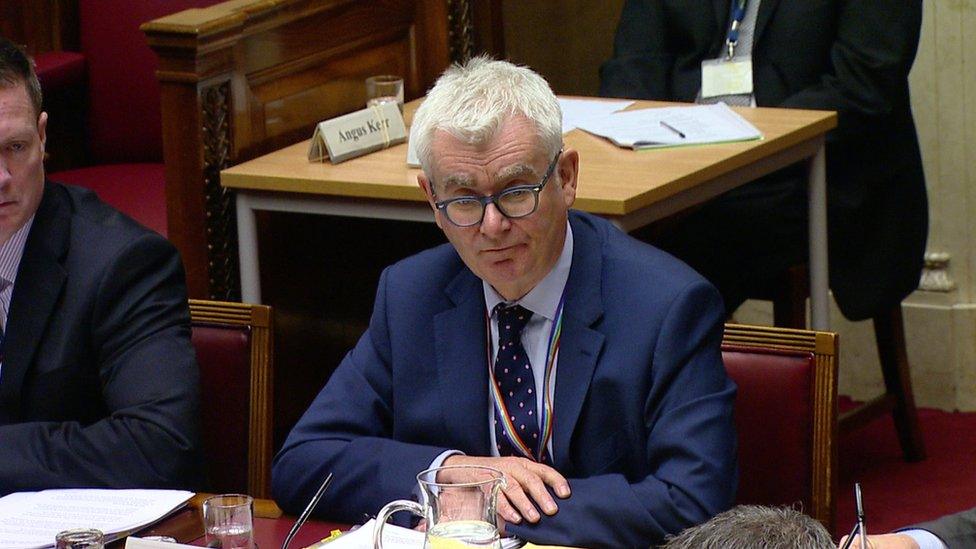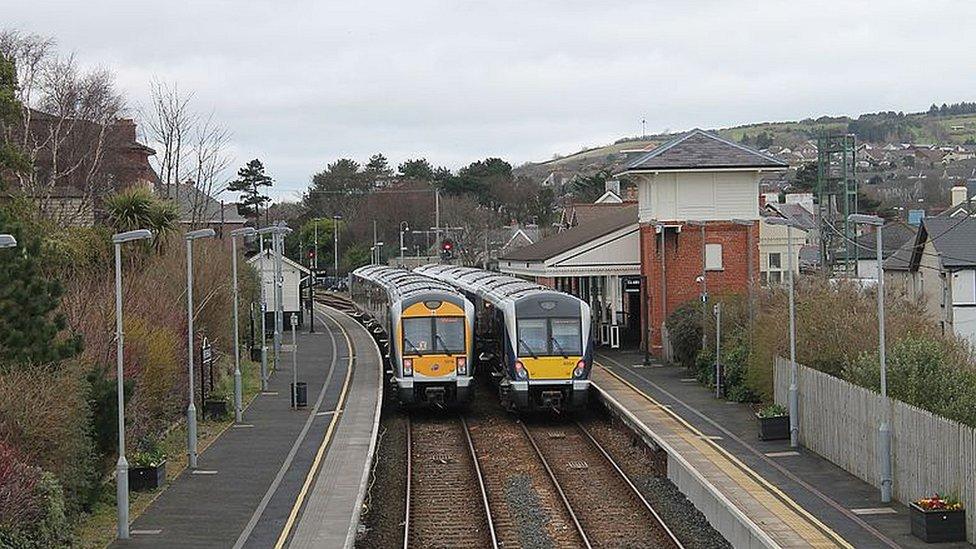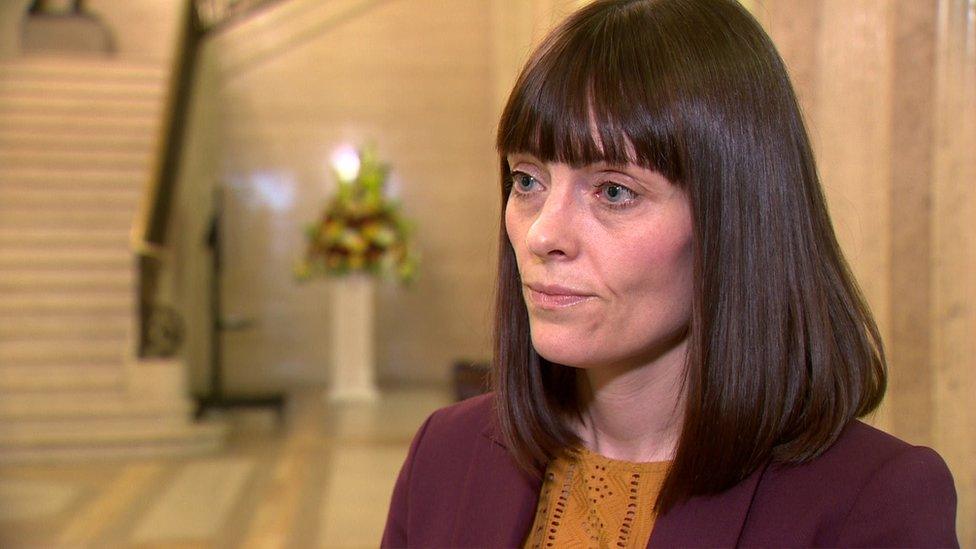Translink: Future of transport company 'in jeopardy' over funding
- Published

Translink runs public bus and train services, including Belfast's Glider buses
A senior civil servant has issued a stark warning on the future of Northern Ireland's public transport network.
In 2015/16, funding provided to Translink by Stormont was cut and its budget has struggled to recover.
Department for Infrastructure official John McGrath told a Stormont committee Translink's viability is "in jeopardy".
Infrastructure Minister Nichola Mallon said her whole department was affected by budget pressures but she was working with other ministers to find solutions.
Her department is Translink's primary source of capital funding, and one of its main sources of revenue income.
'Running out of options'
In 2015/16, the annual subsidy provided to Translink for the public transport network was reduced by some £13m, in line with a series of wider savings that the then Department for Regional Development had to make.
Mr McGrath said while Translink had managed to maintain the rail and bus network by drawing on its reserves, it is now "running out of options".

John McGrath, deputy secretary of the Department for Infrastructure, appeared before MLAs
The department's deputy secretary told MLAs on the Infrastructure committee that if no further investment was provided to Translink, it faced going into 2021 with a deficit of about £28m.
"I doubt there are the savings there to balance the books and yet run the network," he added.
'You'd just close down the railway'
Ulster Unionist MLA Roy Beggs asked what options there were for Translink in the short-term, if additional money was not provided.
Mr McGrath said nothing had been agreed, but suggested that officials might need to look at only running services that are profitable.
"If you ended up only running what was profitable you're talking about bits of Metro, some of the Goldline routes or you could look at - it's not in a scenario anywhere - but you'd just close down the railway.
"There is no document sitting somewhere with that, but because of the scale of this there isn't a 'tighten your belt and it'll be alright' [approach].
"The scale of it means, in our view, the continued viability of the public transport network is in jeopardy."

Translink said it had seen "strong passenger growth" last year
The civil servant said if Translink's funding problems got to that level, any cuts would need to be agreed by Infrastructure Minister Nichola Mallon.
"But it won't be things at the margins, you're talking about hacking at the bone," he told MLAs.
"We've kicked the can down the road because with in-year additions we've bought another year but we don't have that anymore - this is a serious issue."
Mr McGrath also told the committee the department estimated that it needs about £800m in the next financial year to cover its existing commitments, adding that future pledges contained in the New Decade, New Approach deal would require "an awful lot more".
He said Ms Mallon met Finance Minister Conor Murphy last week to set out her concerns and explain what is required for her department, ahead of the next Stormont budget being presented.
'Savage cuts'
Ms Mallon confirmed to BBC News NI that she met Mr Murphy to discuss her department's financial difficulties and also laid out her concerns to him in writing.
"I'm struggling to find money to switch on broken street lights; I don't have the money to have our roads resurfaced," she explained.
"There are very critical budget pressures right across my department. That is as a result of savage budget cuts imposed year on year, there's no secret about that."

Nichola Mallon will be asking Executive ministers to invest more money in public transport
Ms Mallon said she was working with Mr Murphy, other Stormont ministers and Translink to find solutions to the firm's financial problems and she called for greater investment in public transport.
"I believe that executive colleagues share my view on the importance of having a vibrant public transport network," she said.
"Yes, we have budgetary pressures but I believe that we can work together to try to resolve those - the solution can be found across the executive table."
Ms Mallon also called on the Westminster government to honour the commitments it made in last month's New Decade, New Approach deal that restored devolution after a three-year gap.
In a statement, a Translink spokesperson said the firm was continuing to see "strong passenger growth" with 84.5m journeys last year, the highest in 20 years.
"Translink will continue to work with DfI to ensure sustained levels of public service obligation and concessionary fares funding going forward to maintain high quality public transport," the spokesperson said.
"Sustainable public transport is central to the daily lives of many people in Northern Ireland and is essential to the social, economic and environmental wellbeing of the region, supporting the programme for government vision and the goal of zero carbon transport."
- Published14 October 2019
